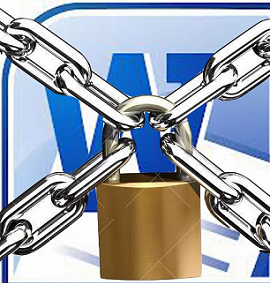
Do you have some confidential information in your Microsoft Word 2010 documents that you don’t want anyone other then yourself to open? If your answer is yes, then follow the steps below and password protect your Microsoft Word 2010 document using Microsoft's built-in encryption feature.
Step 1: Open Microsoft Word 2010 document. Click on File Tab
Step 2: Click on Info option.
Step 4: Select the Encrypt with Password option.
Step 5: A window will pop up asking you to put in the desired password. Set a Password for Word document and click “OK” button.
To Open Password Protected Documents
How to Remove Password from a Word 2010 Document
Step 1: Open Password Protected Microsoft Word 2010 document. Click on File Tab
Step 2: Click on Info option.
Step 3:Click on the Protect Document button under Permissions tab.
Step 4: Select the Encrypt with Password option.
Step 5: A window will pop up which will contains your file’s password, simply select the password and delete it and click “OK” button


Save the changes by pressing CTRL+S Buttons from your keyboard or go to File Tab of your document and click Save option.
Your document is now password free and open for everyone to read and edit. You can see the following message under Permissions “Anyone can open, copy, and change any part of this document”.



Hate to say this but when it comes to removing a known password, the info here is equally as wrong as is found in other sites. Did you all copy from each other or what? Would it not make more sense to verify the information first? You write, "Step 5: A window will pop up which will contains your file’s password, simply select the password and delete it and click “OK” button." The window that pops up does not contain the password but is actually blank therefore there is nothing to delete. Clicking on it empty does nothing as well, still requiring you to use the password again.
ReplyDeleteYou have uploaded a fantastic website.
ReplyDeleteLook into my web page - Coastal Roller Shutters
Michael,
ReplyDeleteEverything on my blog is written and verified by me. All the screen-shots that you are seeing on this blog is taken by me. Before writing the comment, I believe, you should have check the method which is posted here as it works rather then trying to blame the blogger who is trying to help.
As for your answer,
If you are familiar with MS Office then you should know by now that there is more than one way to password protect your files. If, on step 5, your document doesn't show any password then it is not protected using MS Office.
Try to Google it, son! (I might post about this in future as other methods are very hard to follow for basic users.
works perfectly
ReplyDeletethanks
p
Sohail,
ReplyDeleteThat was of great help. Thanks for you help and all efforts you are putting to help other people out
AR
hmm when i click on info i donot see the option of permission? what to do?
ReplyDelete@Anonymous,
ReplyDeleteThe above tutorial applies to Excel 2013, PowerPoint 2013, Word 2013, Excel 2010, PowerPoint 2010, Word 2010. If you are using any of the software mention here then are bound to see the Permission tab under Info option.
Thank You.
Thanks for your help.
ReplyDeleteGreat simple easy steps....thank you so much for having this avail.!!!! Thanks
ReplyDeletethanks for your answer - this works when you did not forget to save your password on another place. At my word 10 version the popupfield is empty and requires the password. I cannot do anything without entering the right password. The popupfield is blocking each other possibilities - no way to the 'protect document' field because popup is waiting for an answer - so I still cannot unprotect and open my private document.
ReplyDeleteThanks for this tutorial! Password protecting is just one, although very useful way, to make sure your documents are secure. Very helpful post!
ReplyDeleteClearly has showned. thanks.
ReplyDeleteI am finding that once I have closed the Word document (having saved my file changes to include a password) then trying to open it again; it still does not need a password when I open it up again. Any ideas what I can try next?
ReplyDelete@V Willis: Please try the second option posted on this website. Follow the link below:
ReplyDeletehttp://nerdsrealm.blogspot.com/2012/02/how-to-password-protect-word-2010_16.html
Very helpful indeed
ReplyDeletethks veeeeeeeeeeerrrryyyy mmmmmuuuuuccccchhhhh.....
very helpful. Thank You.
ReplyDeletemennn, this is cool. THANKS.
ReplyDeleteNice Help, Thanks
ReplyDeletethanks .... nice help
ReplyDeletethanks .. a lot
ReplyDeleteThanks a lot!
ReplyDeleteI put password as you say.but not working pls help
ReplyDeleteSupper
ReplyDeleteThis comment has been removed by a blog administrator.
ReplyDeleteI applied your tips and it worked perfectly. What about a password manager for windows?
ReplyDelete